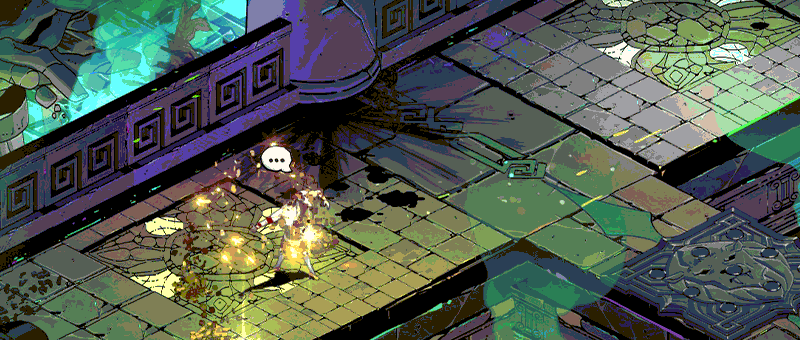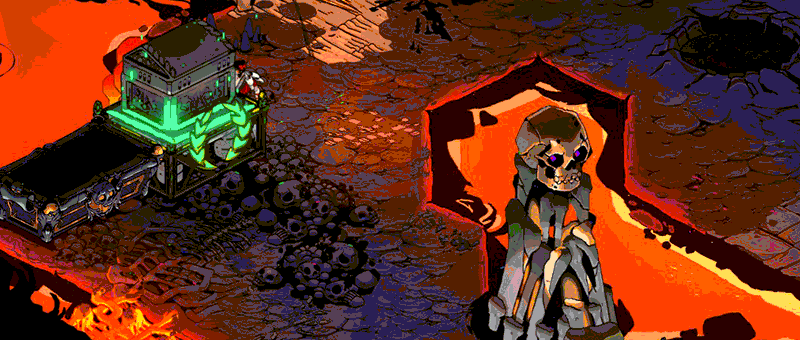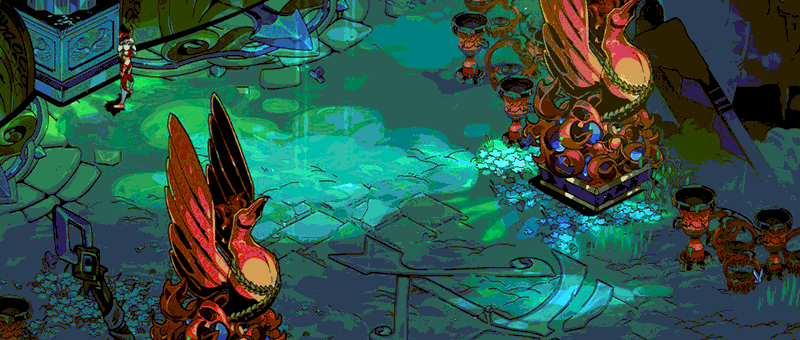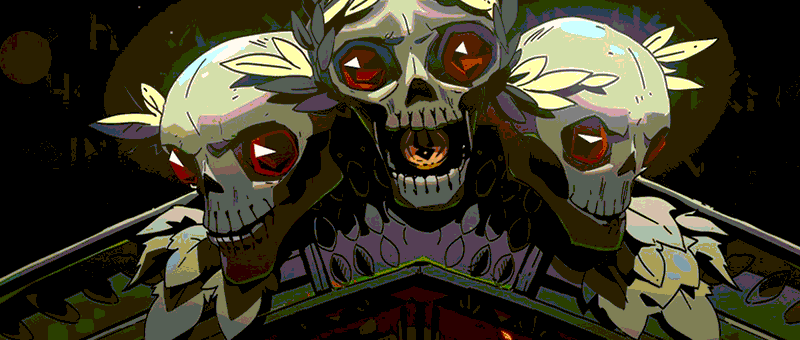
You guys hear about Hades? Supergiant Games' latest game finally hit 1.0 just over a month ago and I'm starting this post with a sort of glib "yeah duh" rhetoric question mostly because a ton of my friends have been playing it, and "most of my friends" is the entire audience of this blog. Anyway, I've been playing a lot of this game - like ~100 hours a lot. At this point all I have left is fairly grindy completionist stuff (or getting really really good at the game), which I might bite on in the future, but I'm feeling kind of done with it for now, so I figured I'd cap off my time with Hades by writing about it.
I'm going to get into my genre purism in a bit here, but for right now - man, roguelikes are really good platforms for delivering video game narratives. Hades certainly isn't the first or only game that doles out the story across multiple runs - I've heard great things about Breath of Fire: Dragon Quarter and Baroque, and, from a wider point of view, games like Pathologic 2 etc. - but man, does it do it well. Aside from the more 'serious' overall narrative, it uses the scarcity of social encounters (you only talk to a character once per run, assuming you don't die before you get a chance to see them) to execute on some amazing long-term bits. After playing Hades, I'm really curious to see more games use this kind of cyclical structure for storytelling. I hear someone's working on translating the Sega Saturn version of Baroque... I'd love to give that game a shot some time.
I'm not going to go full "gameplay/graphics/replay value" review mode, and I'm already kind of worried about the last paragraph having too much "reviewer voice" to it, but before moving on, I did want to note that I'm a big fan of the overall visual presentation. Aside from wishing for maybe more body diversity among the cast, I generally like the interpretations of various Greek mythical figures, and I ended up drawing fanart of Athena, one of my favourite designs in the game.

Between playing a ton of the game myself and watching a bunch of challenge runs on youtube, I'd like to think I've gotten pretty decent at understanding the mechanics of Hades. On a base level, I think the buttons feel good to press and the guy moves around in a fun way when you press them, but the main draw for me - maybe why I've spent so much time on it aside from wanting to see all the writing - has been the way you build out your character. This, to me, is the most interesting decision-making space in the game. It feels great to slowly build up knowledge of which gods' boons work best with which weapon, which ones have synergies with one another, and so on. Once you start getting a better idea of the territory, a single run starts feeling a lot like putting together a Diablo II build, except over the course of 30 minutes rather than 30+ hours.
I'm thinking about that condensed timeframe in relation to drop rates for character upgrades. Roguelikes on the whole, I think, aren't really afraid of dropping something like a +8 blessed vorpal longsword of ice into the players lap because they know that player is going to immediately run longsword-first into a spike trap and die instantly1. Spelunky 2 has, as far as I've encountered, about 4-6 ways to die immediately after picking up a shotgun. Diablo-style ARPGs have had hardcore characters, ladder resets and seasonals for decades now, but they don't really adjust anything about the drop rate to make up for the risk of your progress disappearing whenever. And for all the time you spend investing in a character, there's no real way to guarantee your first unique drop on your hammerdin won't be a Hellcast or something2.
1: I keep telling myself I can take as long as I want on a turn in a roguelike, but I only remember my own advice around 2/3rds of the time.
2: man I love diablo II but that game doesn't really care about you and not in any of the good ways games can not care about the player
As a complete aside, I've recently been getting a lot of youtube ads for a specific mobile game whose main pitch seems to be "you get loot and your numbers get bigger even if you're not playing! it's the game that plays itself!". Aside from generally wondering the function of the word 'play' here (i wonder if the game is having fun; it's interesting to describe the voluntary homework of grinding for loot as 'playing') I keep thinking about who gets really attracted by this pitch. It's one thing when it's some TTS book-reading app that promises you'll be as 'efficient' as a Stanford grad if you listen to microsoft sam read 800 pages of econ self-help a day, but are there people that both want to experience fun from a video game while requiring the experience to be as efficient and time-saving as possible?
I guess mobile games generally are the exact market for this, since you can spend $50k or whatever on seeing if you get the orange thing instead of the blue or purple thing. Anyway, I'm thinking about this game again since I just ended up writing a bunch about the gamefeel of getting frequent drops, and I started getting worried about games like that being the natural bad end for the type of gamer that loves to get items and upgrades. I end up being kind of vulnerable to that kind of structure, since I do love to see my number go up, but between gachas and the like, I think the broad model of "0.5% chance to get the shiny thing" is wildly exploitative more often than not.

For all of the benefits of Hades' character-building structure, it also ends up not feeling like much of a roguelike, which might seem like a huge shocker to hear from me. If you asked me about this evaluation several years ago I'd probably be like "oh yeah no duh, it's not turn-based". I am no longer that man, having played a handful of real-time games that do end up carrying the roguelike spirit (things like Katana-Kami and Spelunky 2), and making instant genre judgements hasn't been interesting to me for a while either. Anyway, I've been thinking about the rogue-lite genre's trajectory a little bit, and where Hades fits in.
Ultimately the fact that "Roguelike" is now just a marketing qualifier for "if you die you lose some progress" doesn't really matter, and the fact Hades doesn't fit into my parameters for a roguelike doesn't really matter either, but I like thinking about genres and the like as trajectories for certain game design ideas across time rather than as a method of grouping similar contemporary games, so I end up using that kind of categorisation in my mind a lot as a sort of navigational tool.
There's a lot of things Hades chooses to drop from roguelike design to instead focus on being a really tight ARPG. For one, progression through the world is fairly pre-determined. You progress through four different biomes in a static order, all but one of them having a set number of floors. Each floor is picked from a pool of arenas designed for whatever biome you're in, and you're only ever moving forward through the dungeon. None of this is a bad thing - it's just that the game is about fighting your way through rather than navigating your way through. Since you're meant to defeat every monster on a floor to move forward, there's no reason to design mechanics that let you juke past enemies to get to the exit safely. Knowing how map generation works on a per-floor and per-run basis can be a huge advantage in roguelikes, but it's usually a 'soft' skill - you can learn that the Lair in DCSS can show up in floors 8-11, but using that information to your advantage is much more difficult than knowing there will always be a boss on floor 14.
In trying to determine the qualities important to roguelikes, I've ended up reading a bunch of writing on the genre. There's the Interpretation of a 'Classic Roguelike' by the charmingly titled Slash, priest of the Temple of the Roguelike that ended up being the basis for the (kind of grognard-y and too-strict by my eye, not to mention very funnily named) Berlin Interpretation of the genre. I'm not really here to debate the top minds of the Berliner Institut für Roguelike- und Turnbasedroleplayingspielen, but I bring these two interpretations up because they both cite randomised environments as necessary, which I personally agree with. The interesting wrinkle here is that both of them state that random generation is there to increase replayability and soften the blow of permadeath (i.e. you don't have to be bored out of your mind replaying floor 1 for the 100th time), rather than to create a navigational decision layer to the game. My initial reaction to this was "I guess???", but thinking about the actual context and conditions of the earliest genre-defining works (Rogue came out in 1980, Moria in 1983 and Hack in 19843), it makes a lot more sense that replayability was the primary intent more than anything else. Dungeon procgen intended as player skill checking might honestly be more attributable to later day roguelikes like Caves of Qud, Dungeon Crawl Stone Soup and the like - even new-style roguelikes such as Spelunky.
3: of course, there were more than two attempts at recreating Rogue in the 80s, but Hack and Moria were ones influential enough to spawn off their own subgenres of -likes (the latter more through its successor Angband than by itself, but still). Interestingly, roguebasin's definition of hacklikes has some characteristics - specifically "complex interaction of properties" - that I associate with roguelikes as a whole. I can't claim to have played a huge variety of classic roguelikes myself, so I was surprised to find out this is a trait associated with one specific evolutionary path. Also surprised that it's associated with Hack specifically, as I don't really like NetHack all that much myself, but I love those complex interactions.
I'm entertaining myself/making myself mad by imagining one of those purist/rebel charts where "roguelike rebel" is "has any game mechanic implemented for the purpose of increasing replayability"
I might be reiterating some things I wrote in my Katana-Kami piece, but some of the things that are most important to me in a roguelike, aside from some form of permadeath and randomised world, is a possibility for complex interactions for game systems, and monsters that follow most if not all rules that players do. If I can lure a fire elemental into a river, filling the entire room with scalding steam and killing my character instantly, it's probably a roguelike to me. Hades kind of uses the "complex interactions" aspect as a starting point for some of its design, but it's not really present in the same kind of form. "You can combine fire and water to make steam" is a skill you can get if you put enough resources towards building your fire and water trees, not as a constant rule in the game world. Your enemies (aside from one notable and very heroic exception) don't ever get access to the same tools you do. Again, this is fine, since Supergiant didn't set out to make a True Classical Vilnius-or-Berlin-Interpretation Roguelike, they're just using the genre in its broad strokes as a base for the kind of game they wanted to make. Choosing to discard or reinterpret certain characteristics of roguelikes is maybe the entire point of the rogue-lite genre, and it's a good idea to do so if it results in a good game (which Hades is, in my opinion).

So what is Hades like, then, if it isn't like Rogue? At some point in my month-long fugue state with the game I saw a couple of tweets comparing rogue-lits such as Hades and Binding of Isaac to arcade games like Final Fight. Initially the comparison didn't really sit right with me - and here I put the blame squarely on the format of a twitter meme for conveying a nuanced point rather than the person making the point - but the longer it's been sitting me, the more fun it is to think about.
Obviously, the similarity here is very loose, and certainly not one born out of a conscious decision to revive the 1cc arcade spirit. Nobody is out there describing their permadeath fantasy hack-n-slash as a Mystara-like (god, I wish, though). Still, there's something there. Roguelikes (here I'm switching back to the broad definition of the term after indulging in being a definition gatekeeper for a bit) are one of two remaining game genres that are allowed to gate progress by killing the player repeatedly, and the only one that doesn't also spawn infinite half-hearted discussions about game difficulty while doing so. This, coupled with the short, repeatable structure at the core of a rogue-lite, makes them a great candidate to being a sort of spiritual successor to some types of arcade games.
Seeing a twitter thread on communal guidebooks in Japanese arcades kind of helped solidify that connection for me. Now here you might say "come on, titas, literally every single game ever has guides and people sharing tips with one another", to which I will reply yes, absolutely, but I'm thinking here about games like The Tower of Druaga, which had enough secrets going on that would make beating the game without outside information improbable, or Capcom's last handful of beat 'em ups (the Dungeons & Dragons duo and Battle Circuit), which were tracing a trajectory that could've winded up not so far away from today's rogue-lites if the genre hadn't petered out in popularity.

And that's kind of my roundabout way of answering that question. Hades is a little bit like Diablo, it's a little bit like Battle Circuit. It's kind of a Gauntletxanadu. It's a Toejam & Earl-lite. The thing I'm saying here is that genres named after one or two games are truly terrible for appreciating games on their own merits, and certainly at least as bad for being able to see the bigger picture of the medium and draw parallel comparisons between different areas. It's certainly worse with some of these than others - if you make a souls-like, you will only ever get compared to Dark Souls. A version of Rogue is coming to Steam on the same day I'm typing this, published by some studio that I guess acquired a bunch of Epyx's old properties. The two main user-defined tags on its store page are "Roguelike" and "Traditional Roguelike", which is a pretty good joke.
Hades is a great action RPG, and a great example of how to pair a surprisingly long narrative with what is essentially a hour-long repeatable structure. Honestly, I probably could've written a post about it without going on another old man tangent about roguelikes for 70% of it, but a post that sounds like "I like the art, and I like how the characters look, and I like using the sword, and I thought the shield was bad at first but I really like it now, and I like the voice acting, and I like greek mythology" for 1000-2000 words is probably something you can find somewhere else if you really want to read it, and I've used up most of my direct gushing about the game in conversations with friends. Probably the least expected thing coming out of it is that I've been thinking about giving a bunch of arcade games from my back-backlog another shot. If I managed to clear this game 50+ times, surely beating something like Metal Slug or Crimzon Clover isn't out of the question.
~titas




